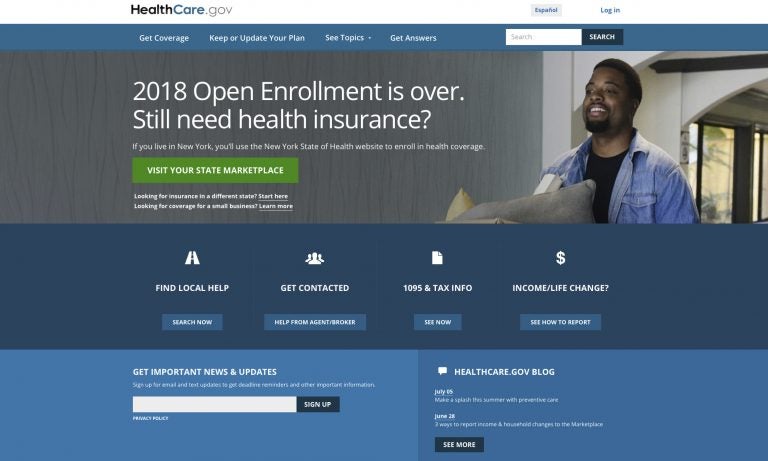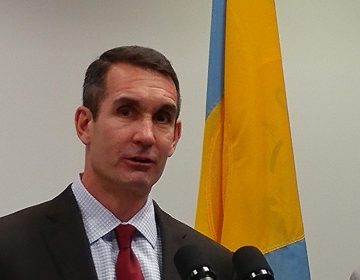With Obamacare seriously wounded, politicians seek a healthy way forward
Listen 5:29
The HealthCare.gov website main page. The Trump administration is clearing the way for insurers to sell short-term health plans as a bargain alternative to pricey “Obamacare” for consumers struggling with high premiums. But the policies don’t have to cover pre-existing conditions and benefits are limited. It’s not certain if that’s going to translate into broad consumer appeal among people who need an individual policy. (HHS via AP)
Now that President Donald Trump’s administration has halted more than $10 billion in payments intended to help insurance companies under the Affordable Care Act, Democrats are accusing him of undermining the nation’s health care system.
It’s a form of retribution against former President Barack Obama, said U.S. Rep Brendan Boyle, a Philadelphia Democrat.
“It’s pretty obvious that, as a punitive measure, the administration is trying to come up with different ways to chip away at [health care] and to weaken it and to make it a more expensive product,” he said.
A bipartisan effort was underway earlier this year to help prop up the health care system as Republicans tried to dismantle the Affordable Care Act without fully repealing and replacing it. That temporary plan to fund the system sought to make sure those who signed up for Obamacare wouldn’t be punished for obeying the law.
Retiring U.S. Rep. Ryan Costello, a Republican representing parts of several counties west of Philadelphia, said the blame for the plan’s failure lies with his GOP colleagues in the House.
“I think the Senate has 60 votes to do it, if I’m not mistaken. The problem is the House,” he said.
Failing to fund the program also meant missing a chance to stop cost increases, Costello said, and the Congressional Budget Office is predicting premiums will go up 15 percent.
“I think it’s probably too late now to stave off premium increases in the fall. Particularly on small-business owners that are on the exchanges. About 8 million people are going to get hit with double-digit premium increases and they are the small businesses out there,” he said.
Still, Costello said, congressional Republicans don’t deserve all the blame because the Trump administration has been in the driver’s seat.
“Democrats often seek to blame Republicans in Congress for things that they haven’t done that perhaps the administration did do. But that’s just the world we live in,” he said.
Other Republicans from the Philadelphia region continue trying to salvage the ACA. Bucks Country Republican Brian Fitzpatrick, for instance, said his No. 1 priority is to keep Obamacare protections for those with pre-existing conditions.
“I’m a believer in fixing — not repealing — Obamacare,” he said. “That’s how I voted.”
But Fitzpatrick also voted for the GOP tax overhaul — which means he helped kill the Affordable Care Act’s mandate that every individual have health insurance because the tax bill ended penalties for those who don’t get coverage. Many experts have said that portion of the law was essential in ensuring that healthy people were part of the insurance risk pool, not just those with costly pre-existing conditions.
Fitzpatrick said he had no regrets on voting to end the tax penalty.
“The initial mandate was broken. I think 80 percent of the people that are paying that fine earn less than $50,000 a year. So, clearly, we need to address that,” he said. “And I do believe in a mandate, by the way. I just think that that mandate wasn’t working.”
Pleas for bipartisanship from both parties
As Fitzpatrick looks for Democrats to work with on salvaging parts of Obamacare, so does Central Jersey Republican Leonard Lance.
“The best health care reform will require bipartisan cooperation, and I did not vote for the Republican bill in this term — and I did not vote for Obamacare,” said Lance. “Obamacare was passed on a purely partisan-line vote, as was the Republican bill. And the way forward is through bipartisan cooperation.”
He’s tempered his hopes, however, with a dose of political realism.
“I hope that we can work in a bipartisan capacity,” Lance said. “I do not know whether that’s possible before the November elections.”
Those who worked to repeal Obamacare are still pushing legislation as well.
South Jersey Republican U.S. Rep. Tom MacArthur was a key ally to GOP leaders on that effort. Mac Arthur said he wants to help prop up the insurance marketplace as his party attempts to transition the nation off Obamacare. And he also wants to set up health associations that would allow businesses to band together to negotiate lower costs.
But he said Democrats aren’t serious negotiating partners.
“The only solution I’m hearing out of the other side is European-style single payer health care system. Socialized medicine is not the answer, the so-called Medicare for All will destroy Medicare for those who actually have it, seniors,” he said. “So that is not the answer.”
But U.S. Rep. Pallone, a Democrat representing parts of the Jersey Shore, faulted MacArthur and other Republicans for failing to stand up to the president. The Trump team has gutted Obamacare from within through regulatory changes, he said.
Trump “continues to sabotage it, he’s doing everything possible to sabotage it and make it harder for people to get health insurance because the prices are going to go up,” Pallone said.
The GOP spent the last few election cycles running against Obamacare, but this year Democrats have regrouped and are running on Obamacare. So even while individual lawmakers have ideas for making coverage more affordable, election season seems to be standing in the way.
WHYY is your source for fact-based, in-depth journalism and information. As a nonprofit organization, we rely on financial support from readers like you. Please give today.




